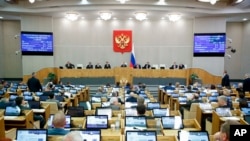Foreign government-funded organizations, including news outlets such as VOA and the BBC, could soon be outlawed in Russia under draft legislation that passed through the State Duma, the lower house of Russia’s parliament, this week.
The bill passed Tuesday seeks to expand a 2015 law that broadened the criteria under which foreign-funded nongovernmental organizations are labeled “undesirable.” The changes mean the designation could be applied to organizations founded by foreign governments or those in which they participate.
The upper chamber must now pass the legislation before President Vladimir Putin can sign it into law.
Russia passed the original undesirable-organization law in 2015, providing for fines on a first offense and up to six years in prison for subsequent offenses in the case of leaders of organizations.
However, when an outlet is labeled undesirable, all of its employees and sources are at risk of fines, criminal charges and jail time of as much as four years.
Pressure increased
The law’s use rose dramatically after Moscow invaded Ukraine in February 2022. Since then, the Kremlin has ramped up what media watchdogs say was an already repressive response to critical news outlets and other groups.
Now, more than 175 organizations are listed as undesirable, including independent Russian news outlets The Moscow Times and Meduza, as well as the Carnegie Endowment for International Peace and VOA’s sister outlet Radio Free Europe/Radio Liberty.
Authorities have also blocked access to several media outlets, including the public broadcasters BBC and DW.
Press freedom experts have said the law is already used to target news outlets and organizations the Kremlin deems critical of Russia. And rights advocates say they believe the change is a way for Moscow to further suppress civil liberties.
Maxim Olenichev, a lawyer with the human rights group Pervy Otdel, or First Department, said he thought the change would further limit “the rights and opportunities of Russians under the guise of fighting ‘external influence.’ ”
“The Russian authorities now see any interaction between their fellow citizens and foreigners as a threat,” Olenichev told VOA’s Russian Service. Pervy Otdel is not on the list of undesirable foreign organizations.
“Russian authorities are looking for external enemies, justifying their policy of isolationism of the country from another, democratic world, where human rights are respected,” Olenichev said.
He noted that since the law was first enacted, hundreds of civil rights groups promoting democracy and human rights have been expelled from Russia.
Change from original
Russia law professor Ilya Shablinsky told VOA that when the original law passed it did not include state-sponsored organizations.
“Now the Kremlin doesn’t care anymore, and the clarification of that law directly affects government organizations,” said Shablinsky, who lives in exile.
He cited the case of the British Council, a cultural and educational organization funded by Britain that was ordered to cease activity in Russia in March 2018.
Under the law, said Shablinsky, Russians who cooperate with foreign government agencies face an increased risk of criminal prosecution.
“Such cases today can now be initiated without any grounds,” he said. “Everything is moving strictly in one direction – tightening.”
The expanded legislation, if passed, could affect broadcasters that receive funding from foreign bodies, including VOA.
Founded in 1942, VOA is funded by Congress but is editorially independent. Its Russian language service has been providing independent news to audiences since 1947.
'Foreign agents'
Russia also has a similar law under which organizations that receive foreign funding can be labeled as “foreign agents.” VOA, as well as its sister outlet RFE/RL, were both declared “foreign agents” in 2017.
Russian authorities use the foreign agent law, enacted in 2012, to target groups and individuals that are critical of the Kremlin, according to press freedom experts.
Russia says the legislation was introduced in response to the United States in 2017 requiring Russian state media to comply with its Foreign Agent Registration Act.
Among the journalists affected by the designation is RFE/RL editor Alsu Kurmasheva, who is serving a 6½-year prison sentence for spreading what the Kremlin said was false information about the military.
Authorities had earlier charged the American-Russian journalist with failing to self-register as a so-called “foreign agent.”
The journalist, who had traveled to Russia from her home in Prague to care for her sick mother, was convicted in a closed-door trial on July 19.
Kurmasheva and her employer reject the charges, and the U.S. government has called for her immediate release.
A second American journalist, The Wall Street Journal’s Evan Gershkovich, has been jailed since March 2023 on espionage charges that he, his employer and the U.S. government deny. A Russian court on July 19 convicted Gershkovich of spying and sentenced him to 16 years behind bars.




